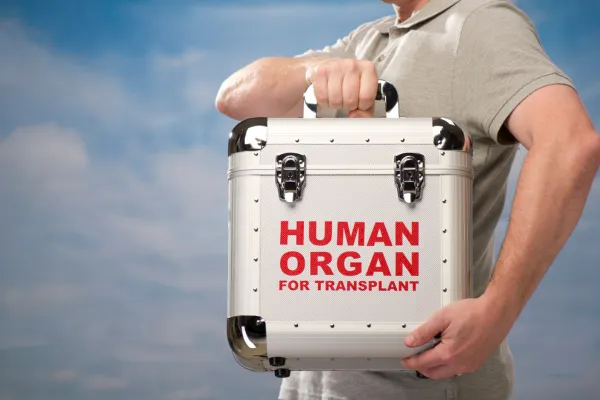
The Truth About Burial Insurance with Organ Transplant
When it comes to organ transplantation, the stakes are undeniably high. For many individuals in need of a new organ to survive, a successful transplant can literally mean the difference between life and death.
However, for an organ transplant to occur, the prospective donor must pass away with their organs intact, allowing for retrieval at a later time.
If you or a loved one is awaiting an organ transplant and intends to donate their body, it's crucial to ensure that you have appropriate burial insurance in place beforehand. Without it, the final arrangements may end up being more costly than anticipated, adding further stress to an already challenging situation.
Here are some important points to consider regarding funeral insurance and its role in cadaveric donation and organ transplantation.
What Does Burial Insurance Cover with Organ Transplant?
Burial insurance with organ transplant serves as a protective measure for the financial well-being of the deceased's family. While anyone seeking to secure their loved ones' future posthumously can opt for this coverage, it's particularly prevalent among those who have recently undergone an organ transplant.
Often referred to as a "burial benefit" or "burial plan," this type of insurance primarily focuses on covering burial expenses for the donor or patient's family members. However, some providers offer additional coverage that extends to various other benefits such as transportation, caskets, and cremation services.
Organ transplantation stands as one of the most remarkable medical advancements in history, significantly enhancing the quality of life for patients and their families. Consequently, an increasing number of individuals are contemplating organ donation to assist others in need.
For some individuals, burial insurance serves as a means to secure their financial interests in the event that their organs are utilized posthumously. With many seniors reaching their 70s, it's imperative to explore available options and understand the potential benefits of such coverage.
Signs of Organ Transplant Rejection
Fever and a sensation of heaviness and tightness in the chest are among the most common symptoms experienced after undergoing organ transplantation. Additionally, individuals may encounter pain in the back or abdomen. These symptoms are often referred to as "rejection" symptoms, as they indicate the body's attempt to reject the newly transplanted organ.
In certain cases, organ transplant recipients may not exhibit any signs or symptoms. This scenario may arise particularly when the transplanted organ poses significant challenges to the recipient's body once integrated.
Why do you need burial insurance with Organ Transplant?
Burial insurance with organ transplant is essential since transplant recipients may experience significant health difficulties and complications. Because of their medical history, typical life insurance can be difficult to obtain, making burial insurance a viable option. It ensures that funeral expenditures are paid, alleviating financial stress on the family during a difficult time and providing peace of mind to both the individual and their loved ones.
What does Burial Insurance with Organ Transplant cover?
Burial insurance with organ transplants covers a wide range of burial expenses, including:
– Casket and vault fees, if applicable.
– Burial site fees, if applicable.
– Funeral director fees, if applicable.
– Military honors fees (if applicable).
– Urn or urns, if applicable.
– Graveside service (if applicable).
Understanding How Burial Insurance with Organ Transplant Functions
Burial insurance with organ transplant operates as a type of life insurance policy specifically designed to cover funeral expenses for individuals who pass away due to conditions like brain damage, multiple sclerosis, heart disease, or organ transplantation.
The costs associated with burial services can vary significantly by state and are often quite high. It's essential to grasp how this type of insurance functions to fully comprehend your options should you decide to acquire such coverage.
A common motivation behind the purchase of burial insurance is the absence of sufficient savings, particularly among those who have lost their employment and lack adequate funds in their retirement accounts to cover end-of-life expenses.
Individuals burdened with substantial medical bills may also consider this option. However, it's important to note that these policies are not intended for debt repayment to creditors but rather to provide financial support to families facing unexpected events such as these.
Do I Need to Undergo a Medical Test for Burial Insurance with Organ Transplant Coverage?
No, you do not need to undergo a medical test to qualify for burial insurance coverage for organ transplant recipients.
When seeking funeral insurance, you simply need to respond to a few basic health inquiries. There's no requirement to furnish medical records or provide blood and urine samples during the application procedure.
In the majority of instances, you can expect to receive official approval from the insurance provider within minutes of applying.
Burial Insurance Underwriting With organ transplant
In the process of underwriting, what information is typically requested?
The typical question is about your overall health and any illnesses you may have.
Also, they will ask about your medication history.
It is vital to determine how risky it is for you to develop certain diseases, such as organ disease.
Health Concern:
Almost every burial insurance company will ask about organ transplants similarly:
Has an organ transplant ever been recommended to you, or have you ever received one?
Are you waiting to accept, or have you been advised that you need an organ transplant?
Has your application for an organ transplant ever been denied?
Have you ever had a body part or organ removed by surgery (other than hair, skin, tonsils, or adenoids)?
Do you have any allergies or sensitivities to medications (e.g., penicillin) that could affect your health?
Have you ever been hospitalized for a condition that could affect your health following your death (e.g., pneumonia and being on oxygen)?
If you answer yes to any of these questions, depending on the company, you may not be eligible for burial insurance or have to pay a higher premium.
Some companies will ask more detailed questions about your health, such as whether you’ve ever been treated for cancer, heart disease, or diabetes.
Check The Prescription history.
During the underwriting process, your insurance company will request prescription information from your pharmacist, who will submit a form known as the RX History (Prescription History).
The underwriting procedure varies depending on the insurance company you apply to and whether this is an individual or group policy.
Your insurer may require medical history papers and data, such as information about any physicians or hospitals you have used, prior treatment or procedures, and laboratory and diagnostic test results.
Common medications for organ transplant:
Azathioprine: Azathioprine functions as an immunosuppressant medication aimed at preventing rejection of transplanted organs. However, it may lead to side effects such as fungal infections, arthritis, gastrointestinal disturbances, kidney issues, and skin rashes.
Basiliximab: This medication is utilized in the treatment of patients who have undergone kidney transplantation or are undergoing dialysis to forestall rejection of the transplanted organ. Potential serious side effects include lupus-like syndrome, anemia, and blood clotting complications.
Belatacept: Belatacept serves as an antibody designed to hinder the immune system's rejection of transplanted organs. However, it carries the risk of severe side effects such as blood clots in the lungs or kidneys, allergic reactions, skin rashes, and elevated levels of liver enzymes indicating potential liver problems.
Mycophenolate Sodium: This medication is employed to forestall rejection of transplanted organs by suppressing immune responses that may lead to inflammation and damage to the recipient's body tissues.
Mycophenolic Acid: Primarily utilized to prevent rejection of transplanted organs in their early stages or in cases of significant immunosuppression resulting from underlying illnesses or disease states.
Daclizumab (Zymar): Used to prevent rejection of transplanted organs, this medication inhibits T cell proliferation and interferes with the production of IL-2 and IFN-gamma, which are responsible for immune responses against transplanted organs.
Muromonab-CD3: Similar to Daclizumab, this medication prevents rejection of transplanted organs by obstructing Th1 cells, which play a role in developing an antibody response against transplanted organs.
Best Insurance Policy Option for Organ Transplant
When it comes to finding the best insurance policy for organ transplant recipients, most burial insurance companies evaluate your eligibility and premium based on the time since your transplant. Remarkably, we offer coverage for seniors who have undergone a transplant up to the age of 85!
Within Two Years of Transplant
To qualify for this option, you must have undergone an organ transplant within the last two years. Guaranteed issue burial insurance is accessible for individuals who have received all types of organ transplants. These policies do not require health inquiries or medical history investigations. If you've recently had a transplant, your approval is assured. Opting for a guaranteed issue burial policy is the optimal solution.
Over Two Years Since Transplant
Insurance companies specializing in organ transplants typically assess the procedure's success over a two-year timeframe. If your transplant occurred more than two years ago, the best option available is a first-day benefit plan offered by burial insurance companies. With this plan, the death benefit starts accumulating from the first day of coverage. The first-day benefit plan stands out as the top choice in this scenario.
What are the benefits of burial insurance with organ transplants?
Cost-Effective Protection:
Burial insurance covers the costs of a funeral, including prepared funeral services and cremation or burial. This coverage can assist ensure that your loved one is properly cared for and respected, as well as relieve some of your financial concerns.
Peace of Mind:
A burial policy provides peace of mind by securing the remains of a loved one after death. If something happened to their body while it was being transported to a funeral home or Crematory, they would be properly buried.
Financial Security:
Burial insurance might help your loved ones bear the financial burden of your death. It can assist you pay for funeral fees as well as any outstanding bills or final obligations.
Organ transplantation is a life-saving treatment for people who require a new organ. While there are numerous advantages to this sort of treatment, it is equally critical to be aware of the potential hazards.
One of the most serious dangers of organ transplantation is the chance of rejection. The new organ is rejected by the body, resulting in serious consequences.
To reduce the chances of rejection, it is critical to explore all options with your doctor before performing this sort of surgery.
How Much Does Burial Insurance with Organ Transplant Cost?
The cost of burial insurance with organ transplant depends on various factors, including the type of policy chosen and the level of coverage required.
Most insurance have terms ranging from five to thirty years.
Policies may also include cash values or cash surrender value options; riders that provide other benefits such as access to nationwide emergency medical evacuation or income replacement; or riders that provide benefits that are geographically limited (for example, only in California).
Why BestBurialPolicy.com Is The Best Option For Your Burial Insurance Needs
Price is often a concern for people when making decisions about their loved ones’ care. However, if considered from the perspective of peace of mind, the value of knowing your loved ones will be taken care of if something happens to you, the price may not seem as significant.
We will be with you every step of the process. Our main goal is to provide the best possible service by answering your questions and providing the best options available. Here are three main reasons why we strive to do this:
We work with a wide range of life insurance companies, ensuring you always have access to the best rates and value. At BestBurialPolicy.com, our agents are experts in Simplified Whole Life insurance and specialize in the needs of seniors.
We’re here to help you find the right coverage to provide for your loved ones, so you can have peace of mind knowing they’re taken care of. We are independent agents, which means we work for you – not the insurance company.
We’ll help you compare policies and find the best option for your needs and budget.
Call us at (855) 468-8900, and we’ll be happy to assist you!
Final Thought
In conclusion, burial insurance with organ transplants is indeed essential coverage. It is necessary if you are the primary breadwinner in your family. If something were to happen to you, your family would be without your income and would also have to worry about funeral expenses. By filling out the quote form on this page, you can get an accurate quote for burial insurance so that you can start to make the necessary arrangements for this coverage.
Evaluate quotes from leading insurance providers
Compare quotes from top insurance carriers
Best Plan For Me
Qualified Health Impairments
This site provides life insurance information and quotes. Each rate shown is a quote based on information provided by the carrier. No portion of BestBurialPolicy.com may be copied, published or distributed in any manner for any purpose without prior written authorization of the owner.




